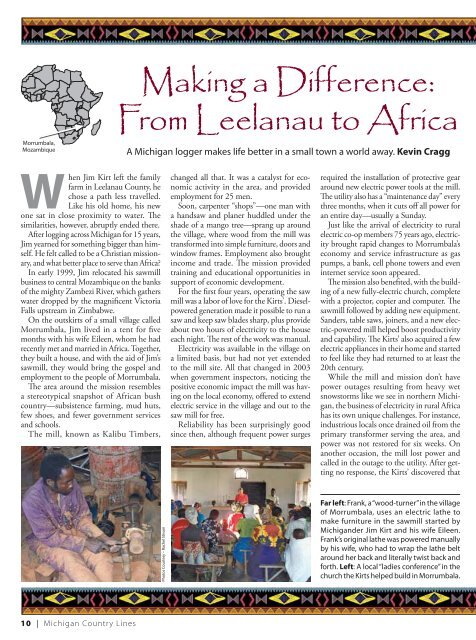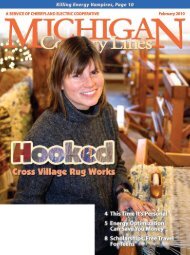Great - Michigan Country Lines Magazine
Great - Michigan Country Lines Magazine
Great - Michigan Country Lines Magazine
Create successful ePaper yourself
Turn your PDF publications into a flip-book with our unique Google optimized e-Paper software.
Morrumbala,<br />
Mozambique<br />
Making a Difference:<br />
From Leelanau to Africa<br />
A <strong>Michigan</strong> logger makes life better in a small town a world away. Kevin Cragg<br />
When Jim Kirt left the family<br />
farm in Leelanau County, he<br />
chose a path less travelled.<br />
Like his old home, his new<br />
one sat in close proximity to water. The<br />
similarities, however, abruptly ended there.<br />
After logging across <strong>Michigan</strong> for 15 years,<br />
Jim yearned for something bigger than himself.<br />
He felt called to be a Christian missionary,<br />
and what better place to serve than Africa?<br />
In early 1999, Jim relocated his sawmill<br />
business to central Mozambique on the banks<br />
of the mighty Zambezi River, which gathers<br />
water dropped by the magnificent Victoria<br />
Falls upstream in Zimbabwe.<br />
On the outskirts of a small village called<br />
Morrumbala, Jim lived in a tent for five<br />
months with his wife Eileen, whom he had<br />
recently met and married in Africa. Together,<br />
they built a house, and with the aid of Jim’s<br />
sawmill, they would bring the gospel and<br />
employment to the people of Morrumbala.<br />
The area around the mission resembles<br />
a stereotypical snapshot of African bush<br />
country—subsistence farming, mud huts,<br />
few shoes, and fewer government services<br />
and schools.<br />
The mill, known as Kalibu Timbers,<br />
changed all that. It was a catalyst for economic<br />
activity in the area, and provided<br />
employment for 25 men.<br />
Soon, carpenter “shops”—one man with<br />
a handsaw and planer huddled under the<br />
shade of a mango tree—sprang up around<br />
the village, where wood from the mill was<br />
transformed into simple furniture, doors and<br />
window frames. Employment also brought<br />
income and trade. The mission provided<br />
training and educational opportunities in<br />
support of economic development.<br />
For the first four years, operating the saw<br />
mill was a labor of love for the Kirts’. Dieselpowered<br />
generation made it possible to run a<br />
saw and keep saw blades sharp, plus provide<br />
about two hours of electricity to the house<br />
each night. The rest of the work was manual.<br />
Electricity was available in the village on<br />
a limited basis, but had not yet extended<br />
to the mill site. All that changed in 2003<br />
when government inspectors, noticing the<br />
positive economic impact the mill was having<br />
on the local economy, offered to extend<br />
electric service in the village and out to the<br />
saw mill for free.<br />
Reliability has been surprisingly good<br />
since then, although frequent power surges<br />
required the installation of protective gear<br />
around new electric power tools at the mill.<br />
The utility also has a “maintenance day” every<br />
three months, when it cuts off all power for<br />
an entire day—usually a Sunday.<br />
Just like the arrival of electricity to rural<br />
electric co-op members 75 years ago, electricity<br />
brought rapid changes to Morrumbala’s<br />
economy and service infrastructure as gas<br />
pumps, a bank, cell phone towers and even<br />
internet service soon appeared.<br />
The mission also benefited, with the building<br />
of a new fully-electric church, complete<br />
with a projector, copier and computer. The<br />
sawmill followed by adding new equipment.<br />
Sanders, table saws, joiners, and a new electric-powered<br />
mill helped boost productivity<br />
and capability. The Kirts’ also acquired a few<br />
electric appliances in their home and started<br />
to feel like they had returned to at least the<br />
20th century.<br />
While the mill and mission don’t have<br />
power outages resulting from heavy wet<br />
snowstorms like we see in northern <strong>Michigan</strong>,<br />
the business of electricity in rural Africa<br />
has its own unique challenges. For instance,<br />
industrious locals once drained oil from the<br />
primary transformer serving the area, and<br />
power was not restored for six weeks. On<br />
another occasion, the mill lost power and<br />
called in the outage to the utility. After getting<br />
no response, the Kirts’ discovered that<br />
Photos Courtesy – Rachel Stivani<br />
Far left: Frank, a “wood-turner” in the village<br />
of Morrumbala, uses an electric lathe to<br />
make furniture in the sawmill started by<br />
<strong>Michigan</strong>der Jim Kirt and his wife Eileen.<br />
Frank’s original lathe was powered manually<br />
by his wife, who had to wrap the lathe belt<br />
around her back and literally twist back and<br />
forth. Left: A local “ladies conference” in the<br />
church the Kirts helped build in Morrumbala.<br />
10 | <strong>Michigan</strong> <strong>Country</strong> <strong>Lines</strong>
















